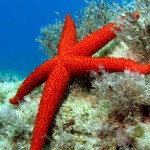We are so happy after we get a new project “Ecosystem services provided by echinoderm holobionts in coastal zones (HOLOSYSTEMS)” founded by the Consejería de Conocimiento, Investigación y Universidad de la Junta de Andalucía (P20.00705).

The ecosystem services that coastal zones provide range from resources for our survival to well-being and recreation. However, pressures from an ever-growing human population threaten their ability to provide these services. In coastal ecosystems, many benthic invertebrates live in association with microorganisms forming holobionts with which they co-evolve and perform diverse functions at the ecosystem level. These symbiotic relationships are established in many echinoderms with bacteria living on the mucus skin or in the subcuticular space. Although the function of these bacteria is still unknown, it has been hypothesized that it may be related to nitrogen recycling. These functions would provide ecosystem services beyond the intrinsic value of their diversity. The main objective of the HOLOSYSTEMS project is to determine whether mucus and subcuticular bacteria are widely established in the phylum Echinodermata of the Alboran Sea and if they assimilate amino acids, nitrates, and ammonium from the environment. For this purpose, in the first phase, we will determine the presence and diversity of these bacteria in the most abundant echinoderm species of the coasts of Granada and Malaga. In addition, we will detect and quantify the functional genes associated with nitrification processes and the potential for nitrogen removal. These results will contribute to knowing the ecosystem services provided by echinoderms. These services could be critical to reduce eutrophication and select the most efficient extractive species for their subsequent use in multi-trophic aquaculture.
